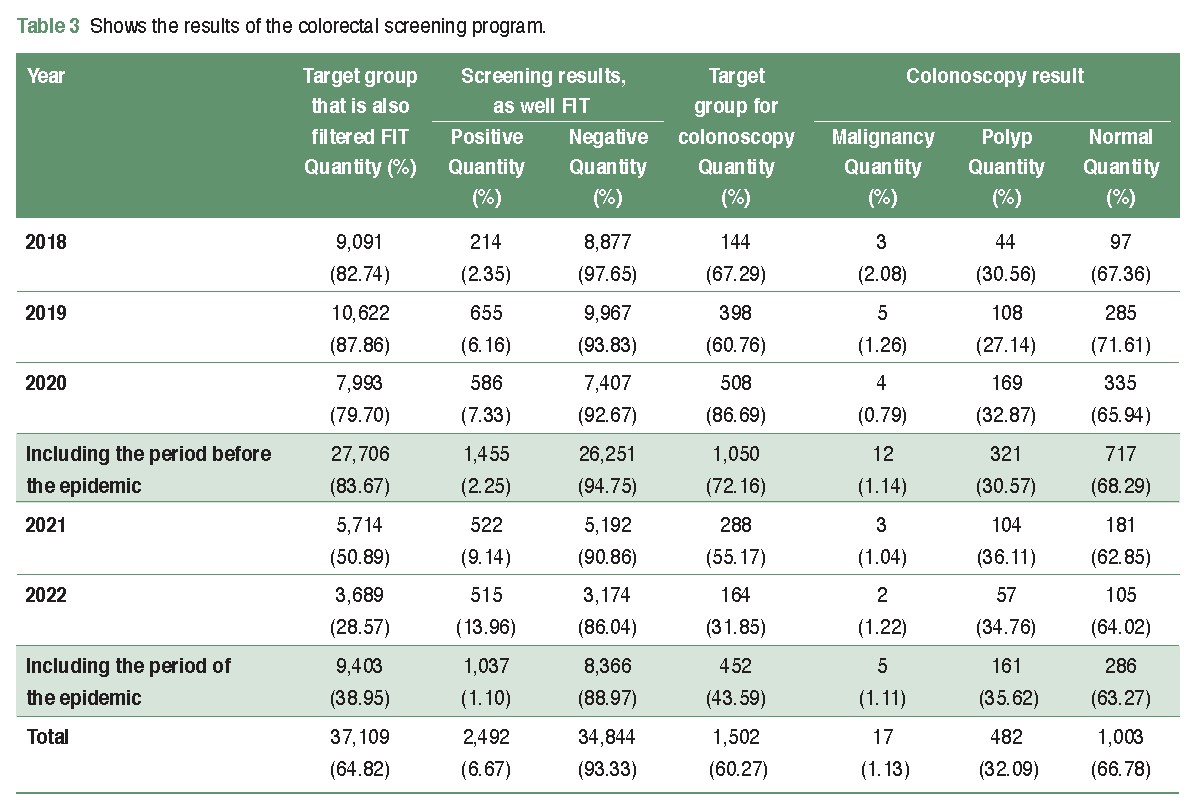The Result of Proactive Colorectal Cancer Screening in Lamphun Province
Keywords:
FIT, Colorectal cancer screening, ColonoscopyAbstract
Background: Colorectal cancer is a highly common cancer and is the cause of death in the world and Thailand. Researcher and leader of the team developing the cancer service system developed a proactive colorectal cancer screening in Lamphun Province 2018 - 2022.
Objective: To study the results of proactive colorectal cancer screening in Lamphun Province.
Materials and Methods: This retrospective study is designed to examine the results of proactive colorectal cancer screening using the FIT, which was considered the first investigation and confirmed by colonoscopy. The target group is the general public aged 50 -70, and the data is analyzed using descriptive statistics.
Results: The results of the proactive screening for colorectal cancer use a fecal immunochemistry test (FIT) cut of 100 ng/ml. Screening by providing services at nearby hospitals when FIT results are positive; registering the colonoscopy appointment on Google Sheets; and performing bowel preparation at the community hospital. Proactive screening found that we were able to screen patients thoroughly in each area, which is not different. Compared with research statistics, there is no statistical significance; the p-value is 0.288. It shows that colorectal cancer screening services are accessible to all areas, even in remote areas, and results from colonoscopy found colonic polyps at 32.09% and cancer at 1.13%. Relevant medical personnel agree that proactive screening methods in Lamphun Province should be used as a standard approach for colorectal cancer screening.
Conclusion: This study demonstrated that proactive colorectal cancer screening has been adjusted from initial screening with the FIT and colonoscopy appointment system. Bowel preparation system. Suitable for the context of Lamphun Province.
References
The Gastroenterological Association of Thailand. Colorectal Cancer Screening (in Thai); updated 2022 [cited 2017 March 12]. Available from: https://www.gastrothai.net/th/knowledge-detail.php?content_id=348.
Saensawas W, Limchareon S. CT Colonography at Burapha University Hospital: An Experience of Patient Satisfaction (in Thai). 2016;3(2):10-7.
Aimpapha P. Enterostomal Therapy Nurse’s Role: Case Study in Nursing Care for Rectal Cancer Patients (in Thai). 2017;10(2):22-34.
Parkin DM, Boyd L, Walker LC. 16. The fraction of cancer attributable to lifestyle and environmental factors in the UK in 2010. Br J Cancer. 2011;105(Suppl 2):S77-81. doi: 10.1038/bjc.2011.489.
Atthaphinan C, Lueboonthavatchai P. Quality of life and associated factors in colorectal cancer patients with colostomy at King Chulalongkorn Memorial Hospital (in Thai). Chula Med J. 2017;61(3):387-400. doi: 10.58837/CHULA.CMJ.61.3.9.
Radiotherapy and Oncology Department of Radiology, Chulalongkorn Hospital. Colorectal cancer screening; 2016 [cited 2016 May 12]. Available from: https://www.chulacancer.net/health-tips-view.php?id=533.
Khomvilai S. Colonic polyp (in Thai); 2017 [cited 2017 July 12]. Available from: http://colorectalchula.com/k1/.
Division of Health Economics and Health Security. Colorectal Screening; 2017 [cited 2022 May 22]. Available from: https://dhes.moph.go.th/wp-content/uploads/2017/11/T3.1.2.pdf.
Kaewinchai R, Pakdevong N. Factors Predicting Fecal Occult Blood and Colorectal Cancer in Risk Group Population in Amphur Kra Tum Ban. APHEIT. 2019;1(1):18-32. doi 10.14456/ajnh.2019.2.
Wattanawongwibul M. The Positive Predictive Value and Number Needed to Colonoscope of Fecal Immuno-Chemical Test 50 versus 100 for Colorectal Screening in Nakhonpathom Hospital. Reg 4-5 Med J. 2019;38(4):318-25.
Lamphun Province. Topography/Climate; 2022 [cited 2022 October 12]. Available from: https://www.lamphun.go.th/information.

Downloads
Published
How to Cite
Issue
Section
License
Copyright (c) 2024 The Royal College of Surgeons of Thailand

This work is licensed under a Creative Commons Attribution-NonCommercial-NoDerivatives 4.0 International License.
Articles must be contributed solely to The Thai Journal of Surgery and when published become the property of the Royal College of Surgeons of Thailand. The Royal College of Surgeons of Thailand reserves copyright on all published materials and such materials may not be reproduced in any form without the written permission.


